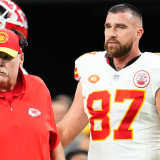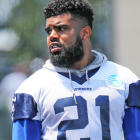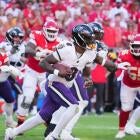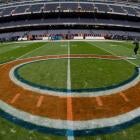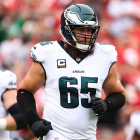Why Ezekiel Elliott could still start Week 1, where to draft him in fantasy
Here's everything you need to know as Elliott awaits an arbitrator's ruling on his six-game NFL suspension
There are less than five days until the start of the 2017 NFL season, and less than seven days until the Dallas Cowboys play against the New York Giants in Week 1. Despite the short time frame, the Cowboys have no idea whether star running back Ezekiel Elliott will be eligible to play.
No one does: not the NFL, not Elliott, not the Cowboys, not your law professor. No one. The only thing we can do is make some educated guesses about what will happen in the future based on what we know from the past.
Let's try and do that by answering some critical questions related to the Elliott case. If you have any extras send them my way on Twitter @WillBrinson.
Why is Elliott suspended in the first place?
Elliott was initially suspended six games by the NFL on August 12 after a year-long investigation into a domestic violence incident that occurred in July 2016, when his then-girlfriend accused him of assault. Law enforcement officials in Ohio declined to proceed with any charges back in September of 2016; the NFL took substantially longer to proceed through the investigation process.
We repeatedly heard there was no timetable for making a decision on Elliott's status, although as late as July of this offseason there was a sense Zeke might be disciplined, despite Jerry Jones maintaining a belief that the NFL had nothing against Elliott in the investigation and that Elliott would be available Week 1 of the season.
So why did Elliott get six games?
In the wake of the NFL bungling its investigation into Ray Rice's domestic violence incident, it became abundantly clear the NFL was not adequately prepared to handle these cases and did not do enough from a discipline standpoint to try and curb the problem. So the league instituted a new domestic violence policy, which calls for a six-game suspension for first-time offenders.
Like anyone else who has been previously punished, Elliott could face a permanent ban from the NFL if he were to get in trouble again on the domestic violence front.
The league claims that Elliott's offseason behavior -- he was allegedly involved in a bar fight and was filmed pulling down a woman's top during a St. Patrick's Day parade -- did not factor into the decision to suspend him, but it seems likely that those two incidents and his general offseason behavior did not help his case.

Did he appeal the suspension?
He did! And the league, as is its right under the current Collective Bargaining Agreement, appointed an arbitrator to hear his case. In this particular instance, the arbitrator was Harold Henderson, who previously heard the case of Greg Hardy, who was also suspended for a domestic violence incident before being signed by the Cowboys.
The hearing itself began last Tuesday and lasted for nearly three full business days, running right on through Thursday.
A ruling is expected to either come down on Monday (Labor Day would be odd but we've seen news drop like that before) or Tuesday, when the league office re-opens.
There is a chance that Elliott's suspension could be reduced to as little as two games -- Henderson reduced Hardy's suspension from 10 games to 4 games previously -- but anything is on the table at this point in terms of a reduction, except for a complete elimination. The odds of that are almost nonexistent.
Did anything notable happen during Elliott's appeal?
Aside from the actual ruling, a lawsuit was born out of the appeal, with the NFLPA hiring famous union attorney Jeffrey Kessler and filing a lawsuit on behalf of Elliott against the NFL in the Eastern District Court of Texas late on Thursday night/early on Friday morning. It was pretty surprising to see the union file the suit before the appeal verdict was handled down, but maybe it shouldn't have been. The NFL sprinted to court after the appeal ruling in Tom Brady's case came down last year to try and secure a favorable jurisdiction. The NFLPA was doing the same thing here and also trying to push a narrative on the public that Elliott was the victim of some high-level executive conspiracy in the NFL offices.
The gist of the conspiracy angle is that the chief investigator for the Elliott case, Kia Roberts, recommended no punishment for Elliott as a result of her year-long probe into the domestic violence allegations, but was not allowed to express that opinion in her report. Additionally, the union claims in its lawsuit that Roger Goodell was not made aware of Roberts' opinion. The NFL has vehemently denied that angle as well as the conspiracy.
And the lawsuit also claimed that both of the NFL investigators questioned the credibility of Elliott's accuser, Tiffany Thompson. There are also viable questions to be asked about the other investigator, Lisa Friel, and her past work.
Because of this lawsuit, it also emerged that Elliott testified to doing drugs in college and enjoying getting drunk. (Note that this does not make him very different from a lot of 20-somethings, but it is also not a good look.)
So what's the next step?
There are actually TWO next steps to focus on at the beginning of the week.
For starters, there is the arbitration award coming from Henderson. This is pretty straightforward: at some point he is going to issue his ruling on Elliott's hearing. He will either vacate the suspension (highly unlikely), reduce the suspension (best bet) or leave the suspension at six games (wouldn't be shocking either). A reduced suspension is most likely because a) Henderson has a history of doing this, b) the NFL has a history of doing this, and c) it will make negotiating to keep Elliott out of court easier.
Secondly, there is a hearing set on Tuesday afternoon to decide whether or not the Eastern District Court of Texas will grant Elliott and the NFLPA a Temporary Restraining Order (TRO) against the NFL relating to whatever arbitration award Henderson issues. This hearing is actually set for 6 p.m. ET so we should have an indication as to whether or not the court is inclined to help Elliott out here by Tuesday evening.

This TRO serves as a bridge for Elliott to a potential injunction. As part of his lawsuit against the NFL, Elliott is asking for an injunction that will allow him to play Week 1, pending the court's decision on his lawsuit.
Basically, the TRO would allow Elliott to practice with the Cowboys leading up to Week 1 while the court makes its decision on the injunction. The injunction is the same thing Tom Brady and the Patriots faced two years ago in the Deflategate lawsuit. NFL legal devotees will recall that before the 2015 season, Brady received an injunction from the court in order to play while the court made a decision on the Brady vs. NFL lawsuit.
Ultimately Brady lost in court (he decided not to proceed to the Supreme Court), but the injunction allowed him to play during the 2015 season. He would eventually lose in court and serve his four-game suspension during the 2016 season.
Elliott is likely hoping for something similar.
So what is the court trying to decide here?
The court basically has to decide whether it will a) shoot down Elliott's lawsuit or b) grant an injunction so Elliott can play while the court decides to hear the case. The only downside here for Elliott is, rather ironically, the Brady case. Because there is clear precedent for higher courts saying "tough luck, pal, the NFL can do what it wants because of the CBA the union agreed to." It is very much a possibility that the courts will decide not to grant Elliott's injunction.
Additionally, the legal system is heavily in favor of enforcing arbitration awards handed out as part of Collective Bargaining Agreements. This is not so much about "Roger Goodell having too much power" as it is about "two sides agreeing to resolve a dispute in a certain manner and sticking to it."
Whether or not Goodell should be allowed to mete out whatever punishment he wants is irrelevant here; the NFL and NFLPA agreed to the rules when they signed the CBA. The court is strongly in favor of them resolving their differences through the agreed-upon rules. It's a foundational piece of labor law that extends well beyond a battle between football owners and football players.
When will we know if Elliott is playing Week 1?
It's going to be close. There are basically four business days (Tuesday-Friday) for the court to issue a ruling before the Cowboys are scheduled to play against the Giants. If the court does not grant the TRO or the injunction, Elliott will remain suspended and will not be eligible to play in Week 1 against the Giants.
If the court does grant the injunction, Elliott's suspension will be temporarily vacated and he will be eligible to play against the Giants. This could happen as late as Friday afternoon/evening, which is why Elliott's lawyers want the TRO -- if he's going to play Sunday, the Cowboys want Elliott to practice all week.
Given that courts are typically conservative in these matters, it would not be a surprise at all to see the court grant the TRO and the injunction. Not doing so would cost Elliott at least one game on the field that he literally can never get back. He could be irreparably harmed, in theory.
So he might not miss any games in 2017?
It's entirely possible. If the injunction is granted by the court, Elliott will be eligible to play right up until the court hears his case. One major caveat here: in the Brady matter, the court decided to wait until after the 2015 season to hear his case. That is by no means a requirement, although it would seem likely given the schedule of the NFL season and the difficulty in forcing a football player into court during the stretch of time when he is playing football.
The court could hear Elliott's case in November, though, in which case Elliott could theoretically lose in late November or early December and miss however many games he is suspended (depending on Henderson's ruling, up to six games obviously) at some random point in the season.
That would be ... problematic for the Cowboys. Especially if Dallas looked like it was going to make the playoffs. Which is why if Henderson dropped the suspension to two games, Elliott has to at least considering agreeing to miss a couple games to avoid the multi-month/year hassle.
If the TRO is granted, that is a positive sign for the injunction being granted. If the TRO is denied, it is a red flag for the injunction.
And, of course, Tuesday could be when Henderson announces the appeal ruling. The appeal award will tell us a lot about what Elliott's camp wants to do going forward.
Not to be a jerk, but where should I draft him in fantasy?
It's a fair question, especially with a bunch of drafts happening in the next few days. If you want Elliott, you are probably going to need to use a high amount of draft capital on him.
I personally took Elliott in the second round (No. 19 overall) of a 12-team, 0.5-point PPR league and paired him with Odell Beckham, Jr. I'm sitting on a monster if I can stay above .500 for the first six weeks of the season.If Elliott ends up being granted the injunction and plays the full season, well, it's a massive steal.
Jamey Eisenberg took him No. 3 overall in our 12-team standard league mock on Friday after the lawsuit was filed, but that's a little too rich for my blood because of the risk that's involved here. I'd rather have an elite receiver most of the time anyway. But if you buy into the idea that Zeke is going to play and don't want to miss out on him, it is perfectly fine to pull trigger in the first round.
Regardless of when you take him, you want to make sure you land Darren McFadden too. I snared him in the ninth round of my aforementioned 0.5-PPR league but if you want to guarantee you get him, the seventh round isn't too early to pull the trigger.


